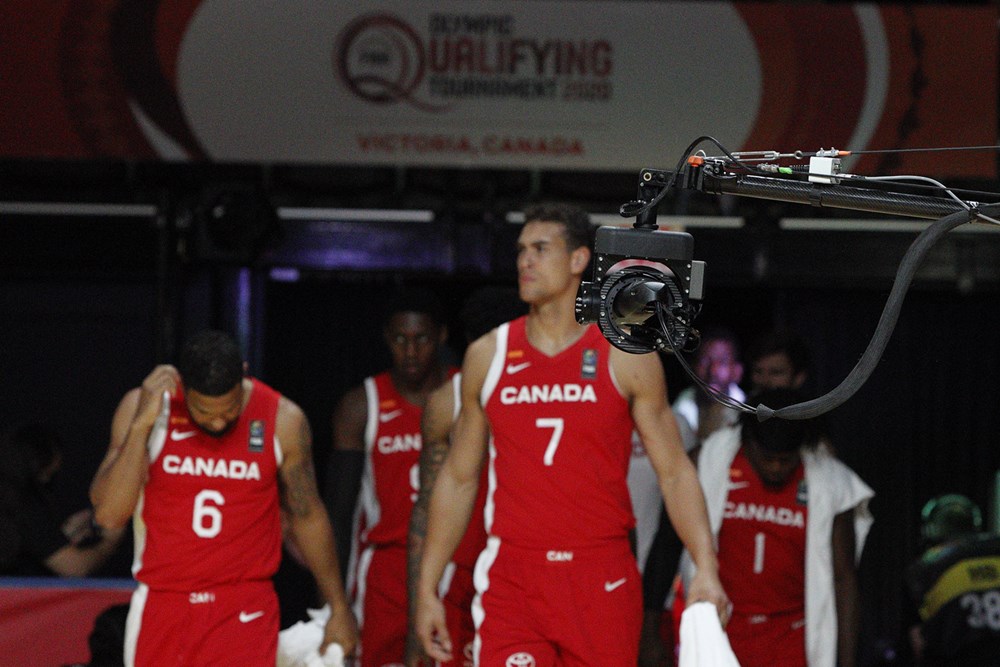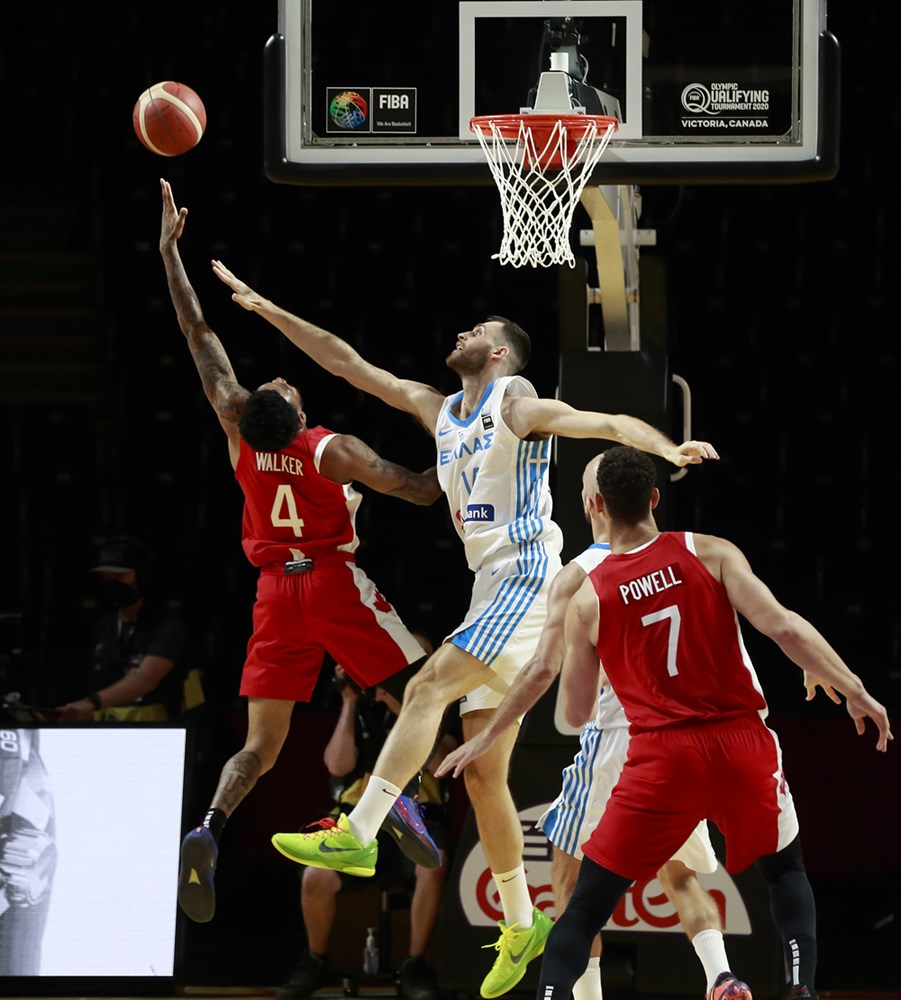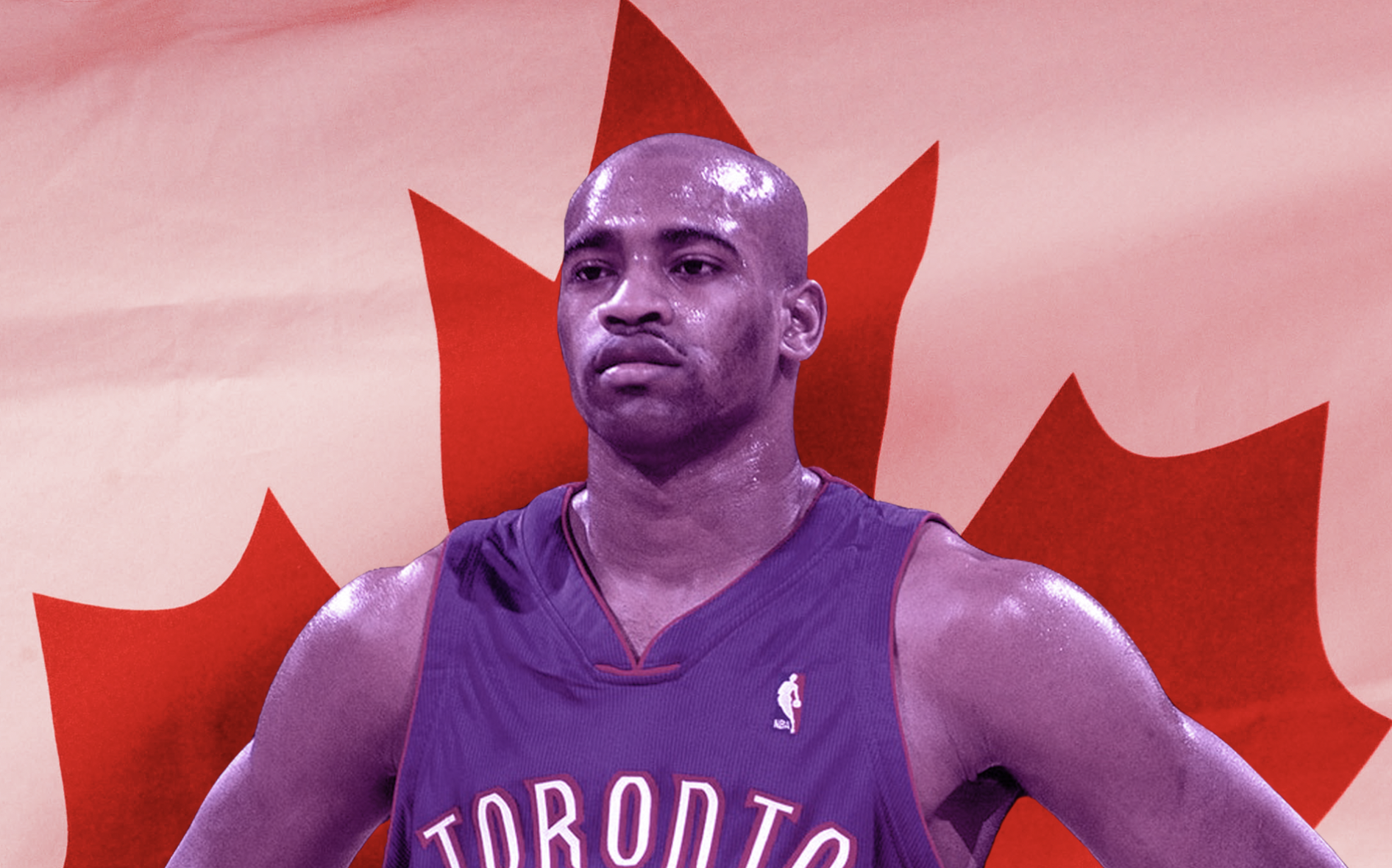VICTORIA, B.C. – Team Canada only brought one traditional center to their Olympic qualifying tournament in Victoria, and he happened to be coming off a torn achilles in January, 2020.
In fact, after recovering from the injury to start the 2020-21 NBA season, Dwight Powell was in and out of the rotation in Dallas, receiving 5 DNPs and only playing 16.7 minutes per game, his lowest since the 2015-16 season. Powell averaged about the same minutes in the playoffs, with Boban Marjanovic playing ahead of him despite his huge performance in a Game 5 win over the Los Angelos Clippers in the first round.
If that didn’t leave a great taste in Powell’s mouth, the way he has started this tournament for Team Canada should.
Powell has not been the best player for Team Canada through two games. That’s likely never going to be the case. There is simply too much skill on the roster, especially in players like RJ Barrett and Andrew Wiggins, who have carried the scoring load through the first to games. But Powell is playing some of the best basketball he has played since the injury — maybe some of the best of his career — and it couldn’t come at a better time for Team Canada, who are relying on him heavily and will continue to do so against what will likely be even bigger, more physical opponents in the semi-final and final.
In Team Canada’s 109-79 win over China on Wednesday, Powell didn’t do anything flashy. But his positional defence and athleticism allow him to always be in the right spots for Team Canada, breaking up lobs in the pick-and-roll, blocking shots at the rim, and boxing out bigger opponents to get rebounds. He’s constantly communicating with teammates, telling them to match up in transition and covering for them if they get beat.
“I’m way more comfortable [beside him],” Team Canada frontcourt-mate Lu Dort told Raptors Republic after the game. “He has a lot of experience. He’s been in the league for a long time. And, you know, he’s really athletic, he moves well. So, sometimes when I get beat I can trust him to go get it for me.”
Offensively, Powell is an uber-efficient 9-11 through two games, along with 3 assists and some really solid screen setting that has freed up Team Canada’s guard to get to their spots. More amazingly, he has had 5 offensive rebounds in each game of the first two games, giving him ten already in the tournament, and a lot of them have resulted in second-chance points, which the Canadians have 39 of through two games. There is a reason Powell is +14 through two games.
“He’s had two really good games,” Nick Nurse said after the win. “I think [what he brings is] just his energy and his effort in a lot of facets with his speed, rebounding, physicality, and communication. He’s really got some key put-backs, I think. He’s been a real problem on the glass at both ends (for the other team). But no, he’s been really good. He’s been solid, like you said, the anchor of our defence and the anchor of our rebounding, so he’s played really good.”
Of course, Andrew Nicholson has been a great backup five, fighting with bigger centers, scoring from all three levels and, as Nick Nurse said, using his special ability to find open space on the floor by “either posting up or holding position, filtering into the high post, trailing on a three, or picking and popping for a three.”
But it’s Powell who is the defensive anchor for this team. He is the main source of communication and the main rim-protector when his teammates get beat. He is guarding the best centers on opposing teams, and is not only holding up, but out-playing them in over 23 minutes a game.
In fact, if there was any doubt about Powell’s health due to his somewhat lost season most recent in Dallas, it has been cast aside.
“I can’t even tell he got hurt the way he moves, the way he jumps. And, you know, he’s still going to keep getting better,” is how Dort described Powell’s athleticism.
As for Nicholson, he said: “It’s amazing. I love watching him play. He’s super athletic, very intense. I love watching him in Dallas, love watching him here.”
It wasn’t supposed to be this way. Originally, it looked like bigs would be one of the deepest positions on this roster, as Canada has a ton of talented big men playing in the NBA. But then Kelly Olynyk, Khem Birch, and Tristan Thompson all dropped out at the last minute, leaving Canada with three or four centers in training camp: Powell and Nicholson, along with Purdue’s Zach Edey and Canadian veteran Owen Klassen. Edey made it to Victoria, but was ultimately left off the final 12-man roster.
Clearly, the front office and coaching staff had trust in Powell that he would not only stay healthy throughout the tournament, but also that he would defend bigger centers, be a communicator at the backline, block shots, grab rebounds on both sides of the ball, switch onto perimeter players without issue — especially in the game against Greece, where Nurse felt comfortable switching one-through-five and asking Powell to guard the perimeter — and setting hard screens to free up his guards. Well, maybe they didn’t expect all of that, which is exactly the point: Powell has gone above and beyond anyone’s reasonable expectations of him this tournament, providing stellar play at the center position on a team that many expected would struggle in that regard.
In the FIBA game that allows more contact and is without a 3-in-the-key rule, allowing big men to stay stationed under the basket indefinitely and play the ball off the rim without being called for goaltending, big men are arguably more important than in the NBA. So, as much as Nurse might want to play small and have a roster well-suited to do so, he will need big men to not only play, but also to dictate the rhythm of the game. Powell has done exactly that through two games, and he will have to carry it forward into the semi-final and final if the Canadians want to win this tournament.
Team Canada earned the top spot in Group A with their wins over Greece and China, and will play the runner-up of Group B in the semi-final on Saturday. That means they will play the winner of Uruguay/Czech Republic in the semis, and Turkey in the final, if they advance. Both The Czech Republic and especially Turkey are tall, long, and physically imposing teams who like to muck up the game, which is exactly why Powell is so important to the Canadians.
Like I said, Canada has more talented players than Powell, including plenty of guards and wings who can dribble, pass, and shoot. But they only have one Dwight Powell. It might sound crazy, but Dwight Powell might be Team Canada’s most important player in this tournament. And as great as he has been so far, he will be needed even more going forward.




